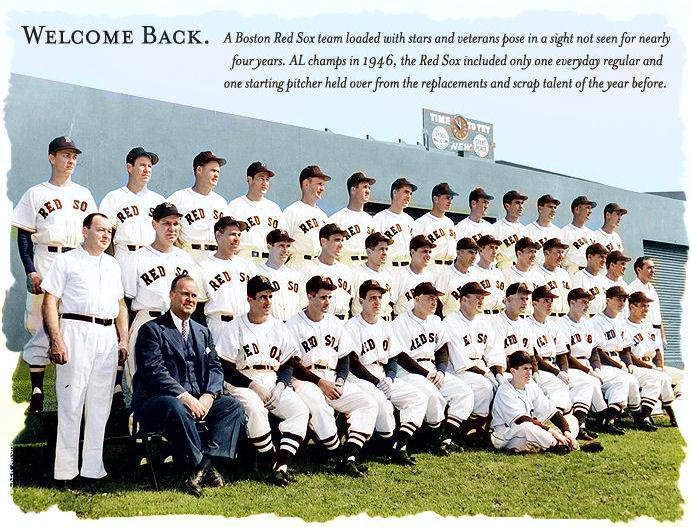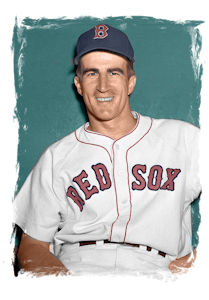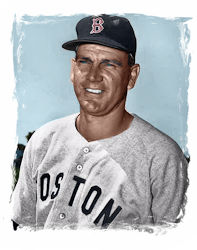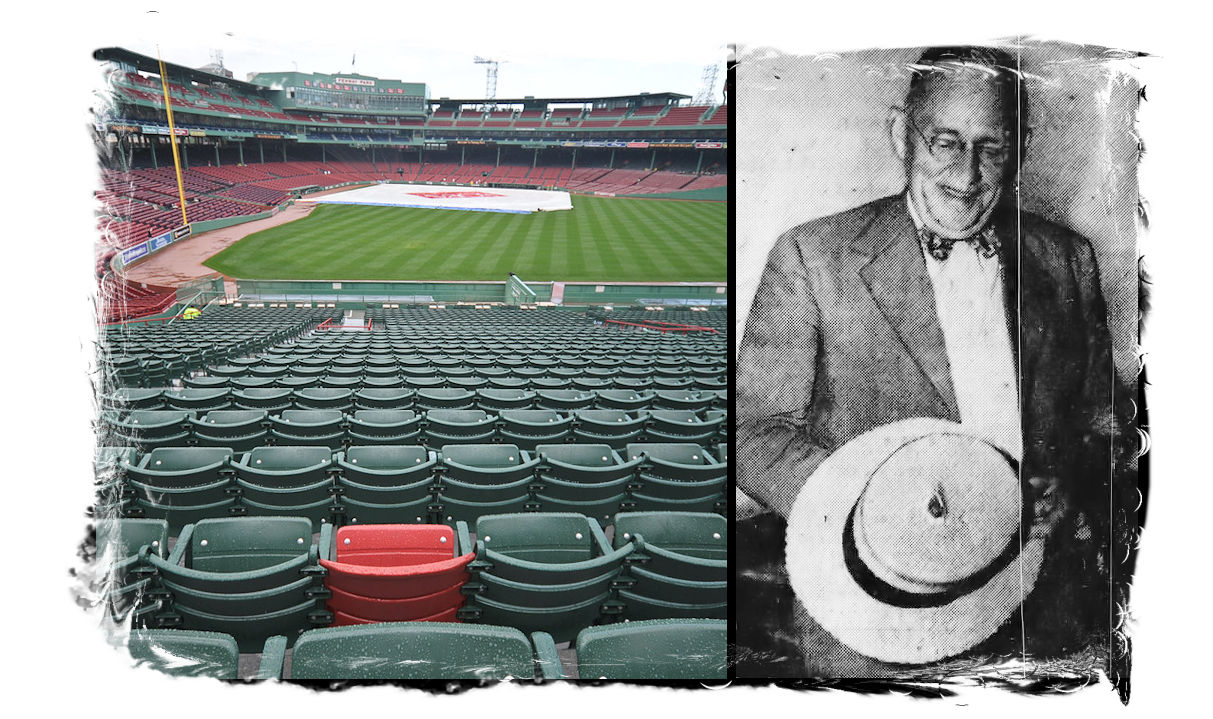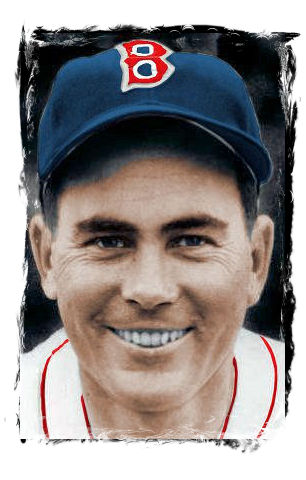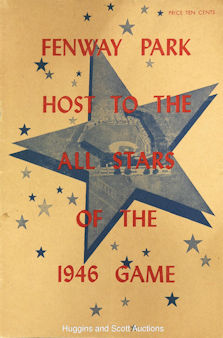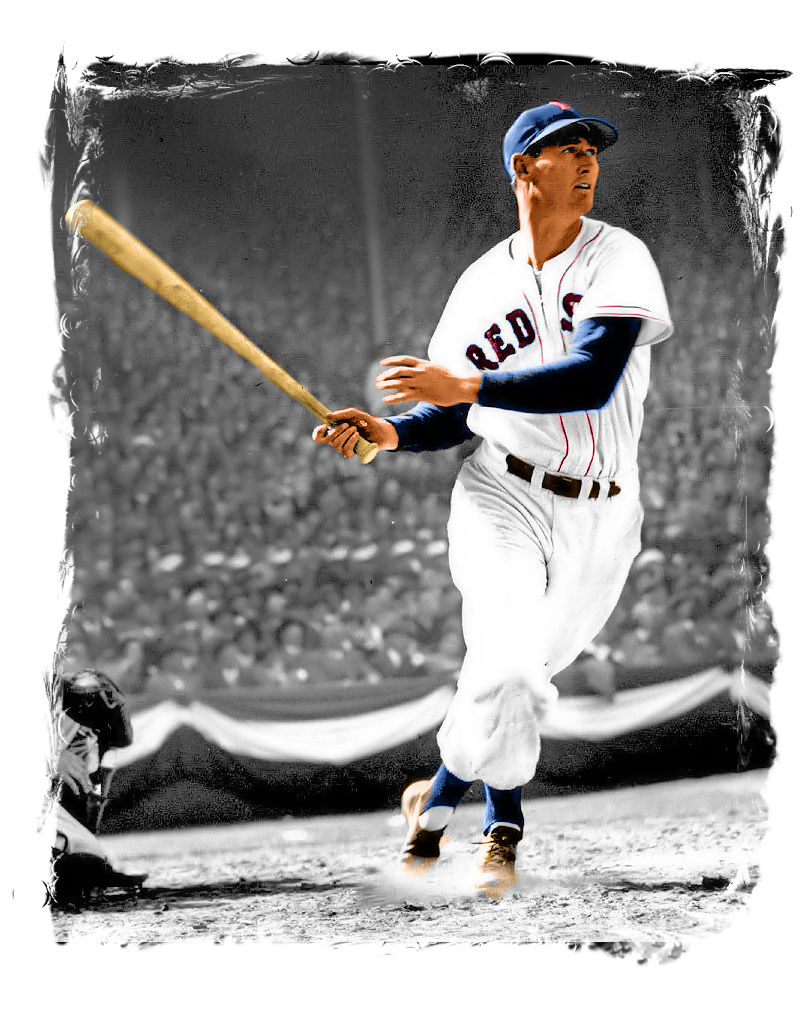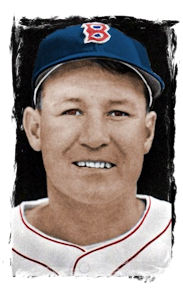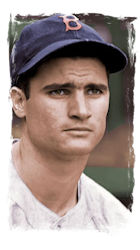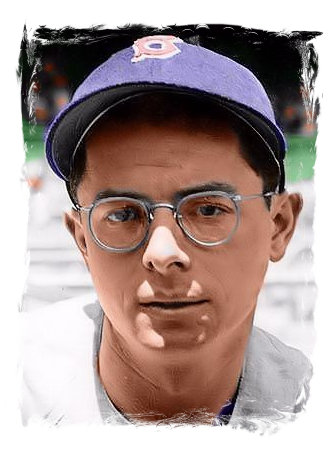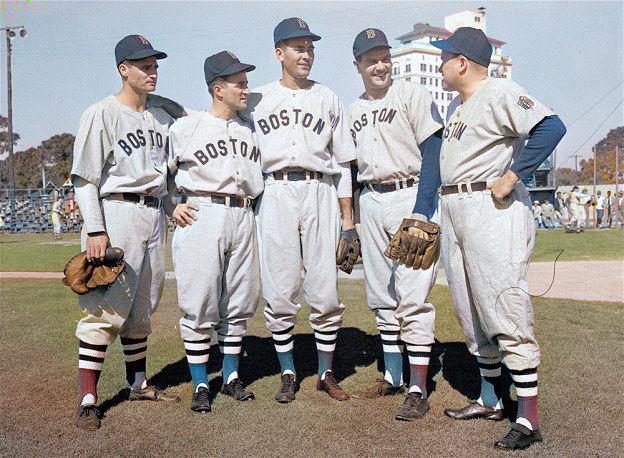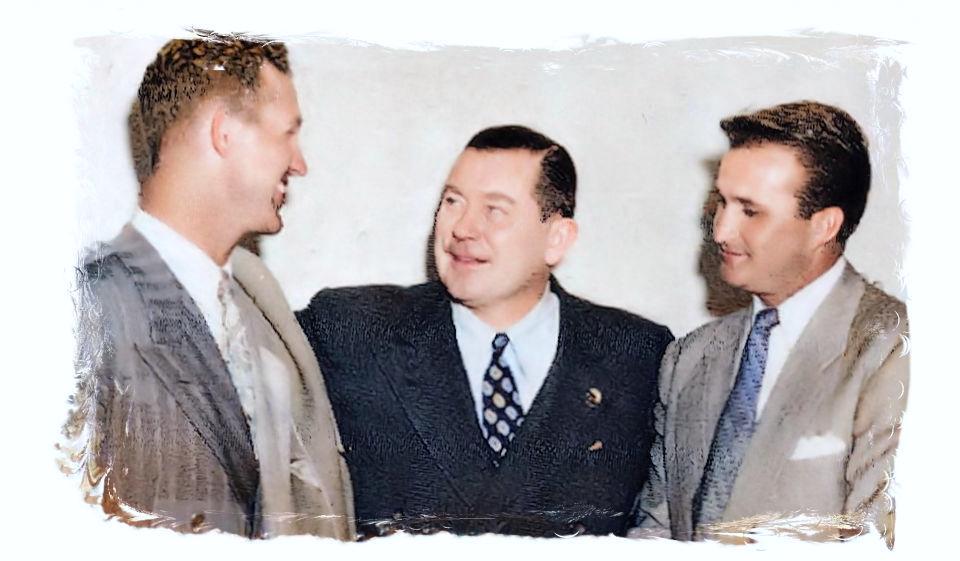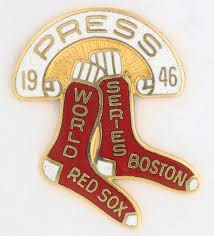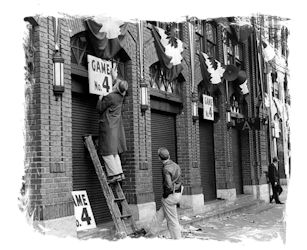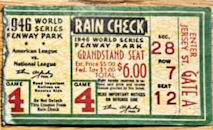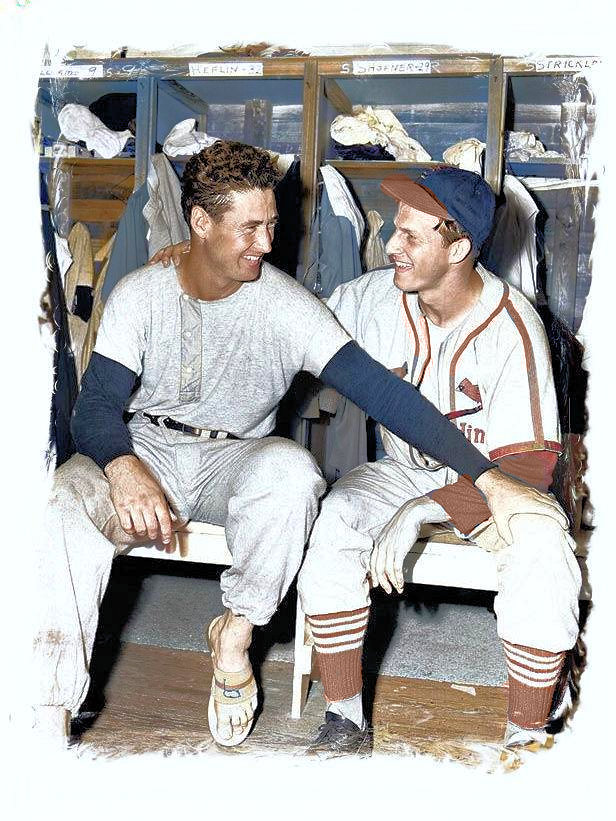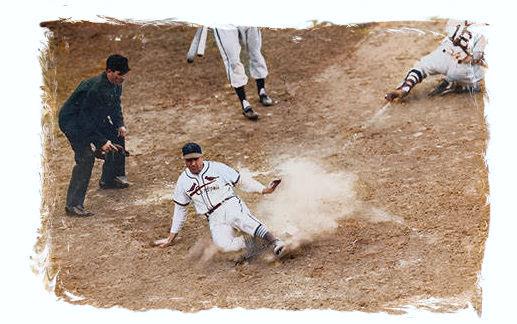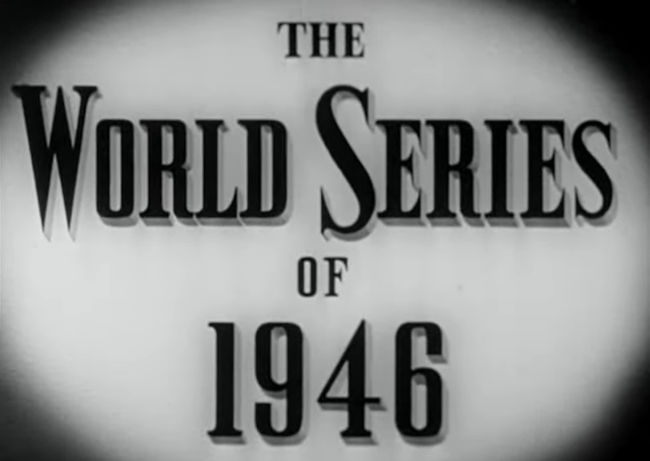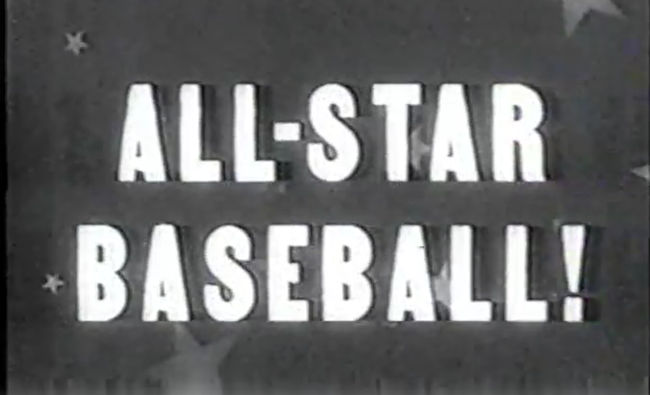|
1946 BOSTON RED SOX
After the end of the war, more than 300 players returned to the major leagues to replace the also-rans who substituted for the during the war. Professional baseball was never more poular because it symbolized a return to normalcy. In late September, Clem Hausmann was traded to the Chicago Cubs for infielder Glenn Russell. On December 11th, Ernie Andres was brought up from Louisville. At the end of January, Earl Johnson, Randy Heflin, Eddie Pellagrini, Jim Bagby, Leon Culberson, Eddie McGah and Bill Conroy signed with the Red Sox. The Red Sox looked invincible. The heart of the club, Johnny Pesky, Ted Williams, Bobby Doerr, and Dom DiMaggio all returned from the service, healthy and in their athletic prime. Dom DiMaggio had emerged as the team's leader. He would become one of the top players in the American League. With Pesky and Doerr up the middle and Dom in centerfield, the pitchers brimmed with confidence. Hal Wagner, who brought a fiery no-nonsense attitude to the Sox clubhouse was back. Dom DiMaggio however returned with a bleak outlook. He knew he had only a few years to play baseball professionally and had lost three of them. Dom felt that because the Red Sox wanted to renew his contract at his pre-war salary, he was being under-valued anticipating that baseball would be more popular than it was before the war. Dom thought he should be free to negotiate with other teams after not having not being signed to a Boston Red Sox contract for three years. But Tom Yawkey agreed to give players like DiMaggio, Pesky, Doerr and Williams a percentage of the projected increased gate revenue over their base salary, so the issue died away. Johnny Pesky wasn't as glum. He told reporters that he was lucky to be healthy and come home because a lot of service members didn't come home at all. Other returning players, who were demoted the minor leagues, sued under the GI Bill of Rights that said that returning vets had to be rehired at that former jobs unless they were impaired. The American Baseball Guild was formed therefore to deal with players' rights, the first salvo in the forming of a players union. But just as America soon learned that victory delivered no lasting guarantee of peace, Red Sox fans learned that the appearance of invincibility brought no guarantee of a world championship. The post war Red Sox were dramatically different from the prewar version. Jimmie Foxx, Joe Cronin and Lefty Grove were gone. Built from within, the postwar Sox represented the bounty of a carefully tended farm system. Attendance at Fenway Park would nearly triple from pre-war levels to over 1 1/2 million fans. For the first time since buying the club in 1933, Tom Yawkey began returning a regular profit. The press still picked the New York Yankees to win the pennant, with the defending champion Detroit Tigers also likely to contend. But on January 4th, anticipating the return of Hank Greenberg, Detroit swapped first baseman Rudy York to the Red Sox for shortstop Eddie Lake. With the return of Johnny Pesky, the Red Sox deemed Lake to be expendable. York's swing was built to pepper the left field wall and plugged one of the few holes in the Sox lineup. But York was the oldest player on the Red Sox and there was concern that his best days were well behind him after he had a poor spring training. However, in an exhibition game in Montgomery Alabama on April 6th, he hit a monster home run and shut everybody up. On January 23rd, Jim Tabor was sold to the Phillies and Ernie Andres was given the third base job. Joe Cronin spent the spring sorting out the returning veterans. There were few surprises. Holdovers from the war years were quickly forgotten. Apart from Dave Ferriss, no pitcher from the 1945 Red Sox made the team. Reserve outfielders George Metkovich, Tom McBride and Leon Culberson were the only returning position players of any consequence. The war hadn't hurt Ted, in fact, it made him physically stronger, and his pilot training aided his concentration. Williams was even more assured, confident, and arrogant than before he left. The Red Sox were now his team and, for better or worse, the two became synonymous. Early on he was hitting .350 and complained that he wasn't getting good pitches to hit. In May and June he knocked out 19 home runs with 53 RBIs. Nobody laughed when the suggestion that he could break Babe Ruth's home run record was mentioned. Yet for all Williams' brilliance, the key to the Boston success was pitching. Tex Hughson's sore arm had healed, Joe Dobson and Mickey Harris were better than average major league pitchers, and Dave Ferriss was one of the few wartime finds with the talent to survive a return to normalcy. Hughson and Ferriss were the best one–two punch in the major leagues, while Harris, Dobson, and swingman Jim Bagby kept Boston in every ballgame. Earl Johnson, Clem Dreisewerd, and Bob Klinger made up the best bullpen in baseball. The American League, would soon learn that no team was in better shape than the Red Sox. They kept the games close until Williams, York or Doerr weighed in with a home run. The only trouble spot for the team was at 3rd base. The club eventually brought back Mike Higgins from Detroit to share the job with Glenn Russell and Ernie Andres. After fishing for ten days, Ted arrived in Sarasota on February 25th. He worked hard to shed the pounds he put on the war and had to endure the blisters that formed on his softened hands. When the team kicked off their exhibition schedule by playing the Washington Nats in Havana, Johnny Pesky, playing with confidence, tripled in the winning run in the ninth inning. A new professional league had also formed in Mexico and they had their sights on signing the major league stars like Ted Williams. While in Havana, Ted was offered a three year contract for $500K. Johnny Pesky was also offered a $50K deal. They listened and were pursued along with others for most of the year unsuccessfully, eventually fading away. Ted was also approached by many companies looking for his endorsement of their product and these all led to Ted hiring a business manager so he could concentrate on baseball. Soon after hiring a man named Fred Corcoran, Ted was signed to endorse Wilson Sporting Goods.
On April 16th, Tex Hughson pitched a complete game and Ted Williams started things off when he hit a 430 ft home run in Washington to get the Sox off and running, with a 6-3 win in the season opener. Johnny Pesky got a double, knocking in two runs. In the next game, on April 17th, Pesky went 3-for-4 and the Sox won 13-6. In the final game of the series, on April 18th, every time Ted came to bat the spectators encouraged the slugger to hit one out . The Kid didn't fail his public. He exploded a towering triple to drive across the first Sox run in his first attempt, and then reached first for the eighth consecutive time, by singling in the second inning. Johnny Pesky was 3-for-5 as the Sox swept the Nats, 3 to 1. Then on April 20th, the Sox only had two hits but were both by Pesky. He scored from second on an infield force play and homered down the right field line to beat Philadelphia in the Fenway opener. It was only his second homer he had hit at Fenway Park. With the score 11 to 5, in favor of the A's on April 21st, Hal Wagner started the ninth inning for the Sox by singling, Glenn Russell sliced a double to right, Dom DiMaggio and Johnny Pesky both walked to force in a run and up came Ted Williams with the bases loaded. Ted lined a single to score two runs, making it 11-8. The inning was climaxed after two were out, by George Metkovich's three-run homer into the right field grandstand that tied the game. Ted ended it by singling to center with the bases loaded and one out in the bottom of the 10th inning, 12-11. Johnny Pesky was beaned in a game on April 22nd and taken off the field on a strecher. He was fine, but rookie Eddie Pellagrini came in to take his place. Pellagrini's first major league at bat was a home run to beat the Nats, 5 to 4. Pesky was back in the lineup on April 24th and Pellagrini moved over to third. The next day, on April 25th, Pelly had a triple, a double and a home run in that order, but failed to hit for the cycle. Pesky had two doubles, two singles, and two RBIs, as the Sox beat the Yankees, 12-5. Dave Ferriss held the Athletics to six well scattered hits, pitching the Red Sox to a 7–0 victory at Shibe Park in Philadelphia on April 26th. Only one Philly batter reached third base against him. Joe Dobson threw a brilliant 4-0 victory for the Red Sox over the Tigers at Fenway Park on April 30th. Only three hits were the Tigers able to fashion against the sharp curves and hopping fastball of Dobson, as he notched his third straight win of the year.
Dave Ferriss went 18 innings, allowing 10 hits and a single run. On May 1st, He threw hitless, runless ball over his final five innings, beating Tigers 13-1. George Metkovich had a 4-for-4 day with a triple. The next day, on May 2nd, Ted Williams hit a walk-off home run in the 10th inning to sweep the series with the Tigers, 5 to 4. Ted was in a groove, hitting four home runs in the first nine games. Ted was the big noise again on May 3rd. He walked the first three times at bat. Then he smacked a double that accounted for two runs, and climaxed his performance with his third home run of the season into the visiting team's bullpen, giving the Sox a 9-4 win over the Indians. Jim Bagby outpitched Bob Feller on May 4th. Johnny Pesky had never faced him before and has a 4-for-4 game that the Sox won 6 to 2. In this nine game winning streak, eight Red Sox pitchers had pitched complete games.
The Red Sox pasted the St. Louis Browns in a twin bill on May 6th. The scores of the double decision were 7 to 5 and 5 to 4. The Sox winning was kept alive in the ninth inning of the second game when Dom DiMaggio lashed a whistling single into center field, to bring home the payoff run. Ted Williams belted his way into a select circle with six hits in seven official tries. But nobody were hotter than Johnny Pesky. He fell one shy of equaling the major league record for successive hits as he became the third big leaguer, in all history, to bash out 11 hits in a row. Of the 11 times he reached base, Johnny had scored seven times. Leon Culberson kept the Red Sox hot streak going with a 14th inning walk-off grand slam home run on May 7th against the Browns. He came to bat in the last of the 14th with the score tied 6-6, resulting from two Red Sox comebacks. With the bases loaded and no outs, he plastered the first pitch into the left field nets for a walk-off 7 to 6 decision. Then, on May 8th, Johnny Pesky set an American League record by scoring six runs in one game. He was 4-for-5 with a double and helped Sox beat Chicago, 14 to 10. He reached safely on six at-bats. Each time he scored a run, such famous names as Lou Gehrig and Jimmie Foxx were in the process of being erased from the record book. Johnny Pesky scored in the first inning against the White Sox on May 9th, making it seven runs scored in a row. Pitcher Bob Klinger was signed by the Sox as a free agent. On May 10th the New York Yankees couldn't stop the Sox from winning their 15th consecutive game. Before a tremendous crowd at Yankee Stadium, the Sox came from behind to beat the Yankees 5 to 4. They won their 21st victory in 24 games and it was Rudy York's triple that wrecked the Yankees. To start the seventh Bobby Doerr walked on four pitches and scored the tying run immediately, when Rudy York drove a triple to deep center field. Dom DiMaggio followed wth a bloop single, scoring York with what would be the winning run. But the next day, on May 11th the Sox (21-3) ended the game winning streak. Fifteen straight wins was the longest in franchise history, when they lost to the Yankees. They had scored more than double the runs of their opponents in the streak. Mickey Harris pitched the Red Sox to a 3 to 1 victory over the Yankees on May 12th. He won his sixth straight game and established himself as the American League's leading pitcher. He allowed only three hits and gave only two walks and did not allow a hit until the fifth inning In Chicago, on May 14th, Dave Ferriss dazzled the White Sox with a brilliant two-hit shutout, with a 3-0 victory. Ferriss made only 78 pitches and was behind exactly three hitters all game. Ernie Andres was the Sox thirdbaseman at the start of the season, but after gretting injured and going 4 for 41. He was farmed out to Minneapolis on May 17th. The 37 year-old Mike Higgins was bought by the Red Sox two days later, to share the third base job with Glenn Russell. On May 18th, the Sox blasted the St. Louis Browns, 18-8, Ted William hit a grandslam homer out of the park, over Grand Avenue and into a house on the other side of the street. Johnny Pesky was 3-for-5 with two doubles.
In a pair of brilliantly pitched ball games, the Red Sox and Detroit Tigers divided a doubleheader at Briggs Stadium on May 19th. Following Dave Ferriss' superb seven hit shutout, which enabled the Sox to cop a 4-0 decision, the Tigers won the nitecap. Ferriss chalked up his fifth consecutive verdict, three on shutouts. On May 21st, Earl Johnson carried the Red Sox to a 6 to 4 triumph over the Detroit Tigers. He pitched five perfect innings of relief and knocked out a pair of whistling doubles that won the game In the 12th inning in a tie game at Cleveland on May 22nd, Johnny Pesky launched the winning rally with a single. The pitcher, Pete Center, threw two balls high and tight to the next batter, Ted Williams. Ted was raving mad as he stepped closer to the plate and took a tighter grip on the bat. He blasted the next pitch a good 400 feet off the roof of a house in back of the high fence in right-center to give the Sox a two run lead. Bobby Doerr continued with a double for his fourth hit and Johnny Lazor's single scored Doerr with another run. The Sox won 7 to 4 and it was the Red Sox third straight extra inning win. The Red Sox came home to Fenway Park and handed the Yankees a 7 to 4 setback on May 25th. With the game tied at two each in the fifth inning, the Sox put the game away. George Metkovich started with a single to left, later scored on Ted Williams' broken bat single into right. Doerr singled and DiMaggio then lined a single to center bringing in Ted. With two outs, Glenn Russell came to the plate and with a 3-0 count, lined a homer well up into the left field screen for a five run inning. Making his eighth consecutive triumph with a six hit shutout, the undefeated Dave Ferriss (8-0) whipped the Athletics, 2-0 on May 29th. He faced only 32 batters and the shut out was his fourth of the year. The Sox (32-9) finished a phenominal month of May winning 19 of the 25 games they played, ending with a 6 1/2 game lead over the Yankees. Ted Williams (.345 BA), Dom DiMaggio (.336 BA), and Johnny Pesky (.335 BA) were in 2nd, 3rd and 4th place in the American League batting race. Ted had nine homers and led with the league with 37 RBIs. Bobby Doerr was second to him in RBIs with 35.
During the first two weeks of June, the Sox put together another 12 game winning streak. Dave Ferriss romped to his ninth consecutive triumph without a defeat on June 3rd, while being touched up for ten hits. Yet it wasn't until he issued his one and only pass, when there were two out in the ninth, that a base hit robbed him of his fifth shutout of the year. The Red Sox scored six times in the last of the eighth-inning to come from behind and beat the St. Louis Browns for their 13th straight victory at Fenway Park with a 9-4 trouncing on June 4th. Bobby Doerr led the way with four hits that included a homer and two doubles. On June 8th, Joe Dobson learned his father had passed away. His brother talked him into staying to pitch because that's what his dad would have wanted. He beat the Tigers 15-4 and left immediately after the game to head back home. Bobby Doerr belted the game's only home run, with two doubles and a single, boosting his league-leading RBI total to 47. Rudy York and Mike Higgins enjoyed a great day, each connecting three times including a double apiece.
Ted Williams hit over .500 for the first nine games in June. His 11th and 12 homers, highlighted the monstrous attack with which the Red Sox twice smashed the Tigers on June 9th. The scores were 7 to 1 and 11 to 6. His second homer was the longest home run ever hit inside Fenway Park. It is commemorated by the red seat. In the first inning of the second game of the doubleheader, Ted hit a ball far over the bullpens to the 33rd row of the bleachers. It hit Joe Boucher on they head, who was sitting in that seat, knocking a hole in his straw hat. Along with Rudy York, who accounted for three runs with his seventh home run of the year, Bill Butland, who was making his first start for the Red Sox, shared individual honors in the 11th straight win, beating the Indians 6-3 on June 10th. The Sox were 41-9, as they then hit their first slump of the season. They lost eight out of their next ten games. Dave Ferriss, who had started off 10-0 lost three games in a row. The team stopped hitting, lost three out of four to the White Sox and were swept by the Browns, losing two of the games 2-0 and 1-0. In the losing streak they lost five games after blowing the lead. After losing three straight, the reeling Red Sox won a ball game on June 16th, but lost the series with the Chicago White Sox when they split a doubleheader, winning the first game 6 to 1 and losing the second game 7 to 4. Bobby Doerr had the big bat by belting a two run homer in each game, making it three home runs in the last two days. The Sox then lost four straight before beating the Indians. On June 21st, Doerr scored from 3rd base on Rudy York's foul pop up to beat Bob Feller in the 10th inning in Cleveland. On June 23rd, in his first start, Bill Zuber beat the Indians with a three hitter in the second game of a doubleheader, winning 6 to 0. One of the games highlights was provided by George Metkovich. In the fifth inning, he reached on an error and moved to third on a ground out. With Ted Williams at bat, he then stole home off Bob Lemon.
Tex Hughson tossed his second straight 1-0 shutout and third of the season on June 25th, as the rallying Red Sox walked to triumph over the Detroit Tigers. Hughson ran his string of scoreless innings to 23. The Sox came from behind in the nightcap to score a 9-3 win after taking a 16-2 beating in the opener from the Tigers in Detroit on June 26th. Ted Williams paused to deliver the pep talk when the Sox were trailing 3 to 2. He turned his words into action to start the eighth-inning. He had matched Hank Greenberg in a brilliant home run duel, each one smacking one in each contest, to remain tied at 19 for the league lead. Before the inning was over, Ted singled to drive across two more runs and take over the RBI lead with 60 to Bobby Doerr's 59. The Sox scored seven runs and Dave Ferriss was in possession of his first win in four starts on this road trip. Celebrating a return to Fenway Park on June 28th, the Red Sox belted three Washington pitchers as Mickey Harris breezed to his 11th win with a 12 to 1 triumph. Ted Williams smashed his 20th homer of the year to put him in front in the league home run derby. The Red Sox hammered out a dozen hits for a 12 to 8 triumph over the Nats on June 29th and kept alive Tex Hughson's winning streak. Ted lashed out a three-run double in the third inning, and a leadoff triple in the sixth. Those hits gave him the lead in the American League batting leadership with a .361 mark. His three RBI raised his total to 65, giving him a three run lead over Bobby Doerr. The Red Sox (50-19) extended their lead over the Yankees to 8 1/2 games by mauling the Nationals, 15-8 in the opener of a twin bill on June 30th. The Sox were 19-9 in June, including the losing streak in the middle of the month where they lost 8 out of the 10 games they played.
The Red Sox broke loose in the eighth inning for four runs and a 5 to 2 victory over the Athletics at Shibe Park on July 5th. Down 2-1 going into the eighth inning, the Sox erupted. Glenn Russell saved the Sox with a slashing single to left field, to bring over two runs and Hal Wagner followed suit with another base hit to bring home the Sox fifth run. Tex Hughson held the Senators 10 hits and just one run in the first game of a July 7th doubleheader. Ted Williams was on base all afternoon. He was on base nine times in eleven at-bats, drawing five base on balls with three being intentional, and contributing three singles and a two run homer over the right field fence. The Sox swept the day, 11 to 1 and 9 to 4. Dom DiMaggio (.349 BA) edged ahead of Ted by two points in the batting race with five hits. The Red Sox cruised into the All-Star Game played at Fenway Park on July 9th. Ted Williams, Dom DiMaggio, Johnny Pesky, Bobby Doerr, Rudy York, Dave Ferriss, Mickey Harris, and Hal Wagner all made the team. Before a capacity crowd, Ted delivered a signature performance. In his first four at-bats, he walked, hit a home run into the centerfield bleachers, and singled twice for the American League team. Thirty nine year-old pitcher Rip Sewell, of the Pittsburgh Pirates took the mound for the National League in the 8th inning. He was best known for his occasional use of what he called an "eephus" pitch. Thrown in a high wide arc like a slow pitch softball, the pitch frustrated hitters. Only the Cardinals Stan Musial had ever hit it for a home run.
Sewell was silent as Ted stepped to the plate with runners on second and third. He fouled off the first "Eephus" pitch, and then Sewell snuck a fastball by him for strike two. A second "Eephus" pitch went wide for a ball. But the third "Eephus" pitch was over the heart of the plate and the ball reversed course sailing into the bullpen as the crowd erupted. The American League won the ballgame 12–0, but after the game was over, all everyone talked about was Ted Williams. Johnny Pesky and Bobby Doerr started in the American League infield but went hitless in two at bats. Ted and Dom DiMaggio started in the outfield. Dom was the lead-off hitter for the American League and went 1-for-2. Rudy York got a hit, coming in to play first base for Mickey Vernon. Hal Wagner pinch hit and was the third catcher used in the game. The Sox started the second half with a walk-off win against the world champion Tigers on July 11th. Glenn Russell hit a double off the left centerfield wall that scored Bobby Doerr from first with two out in the 10th inning, to give the Red Sox a breathtaking 3 to 2 win over Detroit. Rudy York hit a 3 and 0 pitch with the score tied at two each in the eighth-inning and Bobby Doerr on base. It landed in the Detroit Tiger bullpen at Fenway to give the Red Sox a thrilling 4 to 2 win on July 12th. The Red Sox sluggers turned bunters during the eighth inning on July 13th. The Sox scored four runs in that inning to come from behind, for a 5-4 triumph that swept the series from the Detroit Tigers. The performance that Ted Williams had in the All-Star game, must have been just a warm-up, because on July 14th he unloaded his most prolific day as a member of the Red Sox. He smashed three home runs in one game, along with a single, in the opening game of a doubleheader at Fenway Park. He became the 56th player in the history of baseball to have three home runs in a single-game. With his 24th, 25th, and 26th home runs, he figured in nine of the eleven runs the Sox scored with eight RBIs. The Sox won both ends, 11-10 and 6-4 from the Indians, thus widening their league lead to 11 games. After Ted doubled in the second game, Indian player–manager Lou Boudreau, devised his own method to cool him off. Boudreau shifted four infielders to the right side of second base, while the right fielder played the line and the center fielder moved into right–center. Leftfielder George Case was the only player on the left side of the diamond. The logic of the strategy was twofold. Unless the pull–hitting Williams jerked the ball over the fence, there was no room to hit on the right side. But the shift's psychological effect was equally important for it challenged Ted's massive ego and provided a distraction.Ted refused to give in and either bunt or hit the other way. In his first at bat against the shift, he grounded to Boudreau, who was playing where the second baseman generally stood. That shift or something similar to it, was used against Ted for much of the rest of his career. Ted was so good that he eventually learned to hit the ball to left field. The shift was limited to when there was nobody on base, and so it's effectiveness did not prove to be that great. He batted .400 with nine homers against the Indians by the end of the season. Meanwhile, the Yankees had fallen back, and even the great Joe DiMaggio failed to perform to his pre-war standard. Tom Yawkey rewarded his club early, upping manager Joe Cronin's salary to $40,000 and giving each player on the team, a $5000 life insurance policy. Bob Feller pitched his Cleveland Indians to a 6 to 3 victory over the Red Sox on July 16th. The only solace for the Red Sox was Johnny Pesky's perfect day at the plate. Pesky banged out three singles and a double, along with drawing a walk, to regain his American League lead in hits with 106. On July 17th the Red Sox twice subdued the 7th place Chicago White Sox, 3-1 and 6-1, before a capacity crowd at Fenway. It was the ninth twin bill sweep against seven splits for the season. In the bottom half of the sixth inning the next day, July 18th, Tom McBride, who had already singled twice, poked one up against the Chicago bullpen with the game tied at 2-2 in the bottom of the sixth and Mickey Harris the runner at first. Harris ran full steam from first base to score, giving the Red Sox a 3-2 win. The White Sox were held to just four hits by Bill Zuber the next game in a 9 tro 2 win. As usual, Ted Williams was in the thick of it on July 19th. In the first inning, Ted made a bid for a home run over the left field fence. He boomed a soaring drive toward the top of the wall in left center. But the ball missed by a foot and went for a double. Two runs scored to put the Red Sox out front. Ted had never hit a home run to left field at Fenway Park. Nothing appeared to slow down the Red Sox juggernaut. While the Red Sox were twice sinking the Browns by scores of 5 to 0 and 7 to 4, on July 21st, Ted was making seven successive hits, four of which rounded out coveted cycle of a single, a double, a triple and a home run, which was his 27th of the season in the second game. It was the first time that Ted as ever turn the cycle, made seven straight hits, or collected seven safeties in a doubleheader. It was the 10th Sox sweep of a doubleheader which saw Dave Ferriss fashion his fifth shutout of the season and his 15th win in the opening game.
On July 23rd, Wally Moses was waived by the White Sox and the Red Sox claimed him, hoping he could claim the spot in right field from the revolving door of Metkovich, McBride and Culberson. Tex Hughson had his winning touch on July 24th as the Red Sox evened the current series with the White Sox by a score of 4 to 1 at Comiskey Park. With three hits apiece, Rudy York and Johnny Pesky where the batting leaders of the day. However, Ted Williams accounted for his 91st and 92nd RBI with a pair of well stroked singles in five at bats. Johnny Pesky broke out of a slump, going 4 for 6 on July 26th and 3 for 5 the next day. In that game, on July 27th, Rudy York hit two grand slam home runs and drove in 10 runs. Home runs by Williams and Glenn Russell provided the scoring, as Dave Ferriss turned in his 17th victory and his 6th shutout, with a 4 to 0 Red Sox win at Municipal Stadium in Cleveland on July 30th. Bobby Doerr robbed Bob Feller of his third no-hitter with a clean single to left field, but still Rapid Robert won his 20th game with a 4 to 1 handcuffing of the Red Sox at League Park the next day. The Sox (70-29) were 19-11 in July, but increased their lead in the American League to 12 1/2 games over the Yankees.
Ted Williams' 29th homer provided just the support needed by Dave Ferriss to celebrate his 18th victory party with a 5-3 verdict at Briggs Stadium on August 3rd. With two home runs, including his first grand slam of the year, as well as a double, Bobby Doerr batted across seven runs on August 4th as the Sox beat the Tigers again, 9 to 4. Tex Hughson hurled a five hit shutout that bolted him to his 12th victory with a 5 to 0 decision over the last place Athletics at Fenway on August 6th. Bobby Doerr quickly won the contest by piling a pitch in the first inning and driving it into the net above the amplifiers on the left field wall. Wally Moses was aboard at the time. It was Doerr's 15th homer of the season and gave the Red Sox a 2-0 margin in the first inning. The way Hughson was pitching, it turned out that that would be enough. On August 8th, Johnny Pesky snuck a two-run seventh inning homer around the right field foul pole, to give the Sox a 4-1 lead over the Philadelphia A's in the first game of a doubleheader. He had smacked a long ball into the wind and out toward the visiting bullpen in the first inning. The ball fell behind him the rightfielder and Johnny shot around second as the ball came back into the infield. Secondbase man Oscar Grimes fired it into the Philadelphia dugout trying to get Pesky at third, allowing Johnny to score. The Sox won four to three and ran away in the second game, 10 to 6. Johnny was 8-for-8 in the two games with the home run, the triple, three singles, two walks, and reached on an error. Rudy York smashed a zooming home run that rocketed Dave Ferriss and the Red Sox to a 4 to 3 triumph over the Yankees at the Stadium on August 9th. The Sox were trailing 3-1 when he connected in the fifth inning. The next day Ted busted out all over Yankee Stadium with two home runs, a single and several great plays in the outfield, but ultimately sthe Yankees won 7-5, in a 12 inning thriller Dave Ferriss became a 20 game winner for the second straight year at Shibe Park in Philadelphia on August 13th, as the Red Sox toppled the A's by a score of 7 to 5. Hughson limited the A's to just four hits and didn't walk a man as he beat them 3-1, for his 13th win of the year the next day, August 14th. Pesky and DiMaggio each collected two including Dom's sixth home run of the season up onto the left-field roof in the ninth-inning. The Red Sox beat the New York Yankees at Fenway with a 7 to 4 triumph, on August 17th. Two run homers by Ted and Bobby Doerr helped Dave Ferriss widen the Sox pennant lead to 14 full games, the longest it's been all season. The Sox topped the million mark in attendance for the first time in club history. Teetering on the precipice of their first doubleheader loss of the season, the Red Sox rallied for two runs in the eighth inning of the second game for a 4 to 3 victory and a split with the Yankees on August 18th. Mike Higgins doubled off the left-field wall to score Doerr, who came all the way around from first, with the deciding run in the nailbiter second game. Happily for Dave Ferriss, the Red Sox out-slugged the St. Louis Browns by a football score of 12 to 9 on August 21st. Ferriss became the first major-league pitcher to earn his 22nd win. With every member of the Red Sox hitting safely at least once, they combined for 18 hits. Ted had three straight singles and two walks for a perfect day. Pesky also had three singles, while York and Doerr both passed the 100 mark in RBIs.
On August 24th, staging a ninth inning rally for four runs, the Red Sox overhauled the Chicago White Sox by a score of 6-5 in the opener of their doubleheader at Fenway. Down 5-3, an infield hit by Ted touched off the fun in the ninth inning of the opener. Doerr smashed what looked like to be a double-play grounder at thirdbaseman Don Kolloway, but he could not handle it and that put Ted on second and Bobby on first. Next, Rudy York smashed a triple to the 420 ft corner in right-center to score them. Dom DiMaggio wasted no time either, he smashed his winning wallop to the same rights centerfield slot. The White Sox bounced back to take the nightcap. Two homers by Bobby Doerr carried Dave Ferriss to his 23rd triumph and the 11th straight win in a thrilling 2 to 1 victory over the Cleveland Indians on August 25th, 2 to 1. There were two out in the ninth-inning when Doerr came up. Eight batters that had followed his first home run in the seventh had been retired. Doerr clipped a pitch to the right of the horns atop the left-field wall and it landed on the top of the wall to end the game with a walkoff home run. On August 28th, Johnny Pesky had three hits to bring his average up to .3417, just behind Mickey Vernon's league leading .3418 BA. The brilliant pitching of Tex Hughson and Jim Bagby carried the Red Sox a couple of notches closer toward their first flag raising at Fenway Park in 28 years. They setback the Philadelphia Athletics by scores of 6 to 0 and 6 to 2. Bill Zuber, making one of his infrequent mound appearances, also batted in the winning runs as the Red Sox setback the Philadelphia Athletics, 4 to 2 on August 31st. Ted, who had batted only .272 for the month of August, becoming increasingly frustrated by the shift that many of the teams were using against him. His frustration peaked when he was robbed of a home run. In his next at bat he half-heartedly hit a ground ball which he failed to run out. The crowd let him have it as did Rudy York, who confronted him in the clubhouse. Being the older veteran, York often kept the younger players focused as he did with Ted. August was a spectacular month for Johnny Pesky. He hit safely 53 times in the month. The major league mark of 68 hits had been set by Ty Cobb in July, 1912. The Sox (91-40) were 21-11 in August and held a 13 1/2 game lead.
Spearheading the tying rally in the ninth-inning, Leon Culberson wrecked the hopes of Philadelphia A's, when he singled home the winning run in the 10th inning, with a 4 to 3 win on September 1st. In the ninth, Culberson's double and Dom DiMaggio's two-out single forced the game into extra innings. Doerr started the terrific bottom of the 10th inning. He stroked a line drive straight into the hands of Sam Chapman in left field, but the ball popped out of his glove for an error. Crossing up the opposition, York laid down a perfect bunt for a hit. Doerr took third on Mike Higgins sacrifice. Wally Moses hit a long drive which was caught in a distant right-field, allowing Doerr to easily score and Don Gutteridge, who was walked, to take third. Culberson whacked the first serve for a sharp single into left, for the walk-off victory.
The Sox next swept a doubleheader behind the brilliant pitching of Ferriss and Harris at Yankee Stadium by scores of 5 to 2 and 3 to 1 on September 2nd. Dom DiMaggio shared the opening game spotlight with Ferriss. His two run homer in the fifth inning broke a 2 to 2 deadlock. Dom also drove in a run in the second game, to give Harris a little extra breathing margin. Dom's sharp single to center in the seventh inning, provided the power as Hughson hurled his 18th win of the year for a 4 to 2 Red Sox triumph over Washington at Griffith Stadium the next day, September 4th. Jim Bagby pitched the Red Sox a notch closer to the championship, when he shut out the Washington Senators on September 5th, 1-0. The run which produced the latest success and kept the Red Sox 16 1/2 game lead over the Yankees, was fashioned in the second inning on Doerr's triple and Glenn Russell's single. The Red Sox won eight games in a row and led by 16 1/2 games with their magic number to clinch down to "two". Ted Williams (115), Bobby Doerr (113) and Rudy York (110) were the top three leaders in RBIs. They needed four games to clinch, but the Sox suddenly slumped, and the second-place Detroit Tigers refused to lose. On September 11th, the day the Sox had lost their fifth straight game, Ted Williams (.342 BA) went 4-for-4 and passed Johnny Pesky (.336 BA) for batting average lead. Finally, on September 13th, Ted knocked an inside-the-park home run for the only run of the game. At League Park in Cleveland, he hit an opposite field line drive to left. Pat Seery tried to make a shoe-string catch and the ball rolled away from him. Ted scooted around the bases and had to slide home. Tex Hughson spun a three-hitter against Cleveland, to clinch the pennant by a score of, 1 to 0 on Ted's homer. Ferriss won his 25th game, as the American League Champion Boston Red Sox split a doubleheader with the Chicago White Sox on September 15th.
Joe Cronin had himself on the Sox active list, but in June, he removed himself and formally retired. Tom Yawkey then gave him a new contract to manage through the 1947 season. The players contributed their winning to Cronin allowing them to just play ball and leaving them alone. After the pennant was sewn up, Cronin not just rested his players, but allowed some of them to leave for several days, skipping the series with the Browns in St. Louis. Rudy York was one of the players who wanted to stay and play every game. The full squad was back for the final seven games. Leon Culberson's sharp single to center in the 11th inning gave the Red Sox their 100th victory of the season, when they beat the Washington Nationals by a score of 7 to 5 at Griffith Stadium on September 21st. On September 24th, Eddie Pellagrini was honored for being the only homegrown player and given a car. Four days later it was Johnny Pesky Day at Fenway Park. Johnny and his wife were given a house by his friends in his home town, Lynn MA. Tex Hughson joined the select group of 20 game winners, when he staved off a late inning rally to defeat the Washington Nationals, 5 to 4, on September 27th. The Boston fans, who had not cheered since 1918, put in 500,000 requests for World Series tickets. The Red Sox limped through the remainder of the season, but manager Joe Cronin didn't panic. It showed however that the Sox were vulnerable. The Red Sox finished the season with a 104-50 record, 12 games ahead of the Tigers. For the last month the Sox just sorta fiddled around, the sort of action that bred over-confidence. Ted Williams finished the season batting .342 with 38 home runs and 123 RBIs, winning the American League's MVP. But he was fatigued, his body not acclamated to the rigors of a seven month season. He had done most of his prolific hitting in the first half of the season. However, he remained in the spotlight with long profiles in various magazines. Johnny Pesky finished the season batting .335, scoring 115 times and leading the American League in hits with 208. He was named the shortstop on the Sporting News' All Star Major League team. Firstbaseman Rudy York batted .276 with 17 homers and drove in 119 runs as the clean-up hitter. Bobby Doerr batted in a career-high 116 runs thanks to the potent batting order. He once again led the league in four defensive categories: put-outs, assists, double plays and fielding percentage.
George Metkovich had moved from playing first base to right field. He appeared in 86 games and hit .246 with a career high, at the time, .333 on base percentage, driving in 52 runs. Leon Culberson also filled in at right field and batted .313 in 59 games. Tom McBride came off the bench on an irregular basis and actually had a good year in that role. He batted .301 in 61 games and 153 at-bats. Glenn Russell appeared in 80 games, 70 of them at third base, but batted only .208, while Mike Higgins hit .276 in the 64 games he played. Catcher Hal Wagner appeared in 117 games and his 52 RBIs ranked him 5th on the team. He hit a career-high six homers. He started off on fire, batting .400 going into the first week of May, leading the American League at one point, but tailed off to finish with a .230 BA. He was backed up by Roy Partee, who appeared in 40 games and batted .315 in 128 plate appearances. The key to the Sox success was their pitching staff. For the first time since Cronin was the Sox manager, he had four starters who remained healthy all season. Dave Ferriss, who had a great rookie year because of the lesser competition, proved it was no fluke against the first string major leaguers in 1946. He won his first ten games and finished the season with a 25-6 record. Tex Hughson was another 20-game winner, going 20-11 with a 2.75 ERA. HIs 172 strikeouts established a career high. He tossed six shutouts, including four by a 1-0 score. Mickey Harris won his first seven starts and wound up winning 17 games. Bill Zuber had the best season of his career, going 5-1, with a 2.54 ERA. Control was his problem as shown by his 6.19 walk ratio. Bob Klinger was an effective closer for the Red Sox. He finished 20 of the 28 games he came in to, with an excellent 2.37 ERA. In the National League, the St. Louis Cardinals and the Brooklyn Dodgers ended the season tied and had to play a best of three playoff. To stay sharp, the Red Sox recruited a team of American League All-Stars to play some exhibition games. Despite the fact that great ballplayers like Luke Appling, Hank Greenberg, and Joe DiMaggio provided the opposition, fewer than 2000 fans showed up to watch. The game were more of a disaster on the field than at the gate. Dom DiMaggio jammed his thumb catching a line drive and Ted Williams was struck on the right elbow by a pitch.
The Cardinals swept the Dodgers, and on October 3rd, the Red Sox boarded a train for St. Louis. In an instant the series almost became an afterthought. Rumors began to abound that the Red Sox, tired of Ted's behavior, were going to trade him after the series, for Joe DiMaggio. None of the Red Sox executives answered the rumor, therefore giving it some credibility. The Sox players clearly became distracted. Ted kept pumping the press for more information, while Eddie Collins, Joe Cronin, and Tom Yawkey still had no comment. Taking his first batting practice in St. Louis, since being plunked on the elbow, Ted smacked three homers over the right field roof at Sportsman's Park. The Red Sox were heavy favorites to win the World Series. But the St. Louis Cardinals didn't think so and were a cocky bunch.
Tex Hughson opened the series for the Red Sox in Game #1 facing Howie Pollett. In the 9th inning with Mike Higgins on third base and the Sox one strike away from defeat, pinch-hitter Tom McBride singled to tie the score. Rudy York then homered to left and Earl Johnson set down the Cardinals to give the Red Sox a 3–2 win. In Game #2, Cardinals' pitcher Harry Brecheen mixed a devastating screwball with curves and fastballs to out-pitch Mickey Harris. He scattered four hits and knocked in the only run, necessary to win, himself giving the Cardinals a 3–0 victory. The series headed to Boston for the next three games, where at Fenway Park, the Red Sox had accumulated an astounding 61–16 record. Dave Ferriss got the nod to start Game #3 opposite Murray Dickson. York homered in the first inning to knock in three Red Sox runs. Ferriss threw a four hit shutout to give the Red Sox a 4–0 win and a 2–1 lead in the series.
In Game #4 Cronin pitched Tex Hughson on three days rest. The Red Sox played their worst game of the series. Hughson and five relievers were shelled as the Cardinals cruised to an easy 12–3 win to tie up the series. Apart from York and Bobby Doerr, the Red Sox simply were not playing good baseball. Ted Williams was physically hurt and distracted, while Pesky played a nervous shortstop and Dom was pressing, running into outs and making mistakes in the field.
Before Game #5, Doerr had been suffering from migraines and couldn't see straight. Joe Cronin moved the aging Don Gutteridge into the leadoff slot to take the place of Doerr. Gutteridge singled to lead off the game and Ted knocked him in for his only RBI of the series. Sox pitcher Joe Dobson scattered 4 hits and the Red Sox put the game away, leaving the Red Sox with a three-game to two-game lead. In St. Louis, Cronin decided to pitch Mickey Harris in Game #6, who the Cardinals had already beaten. The Sox jumped out quickly. With one out, Johnny Pesky and Dom DiMaggio singled to bring up Ted in one of the most important at-bats of his career. Harry Brecheen were carefully and walked him, bringing up York the bases loaded, who grounded out into a double play. By the fourth inning, the Cardinals had jumped out to a 3–0 lead and Mickey Harris was sent to the showers. Tex Hughson came in and stopped the Cardinals cold, but it was too late. St. Louis won the game 4–1 to tie the series and send it to a seventh and deciding game. For Game #7, the Red Sox sent Ferriss to oppose Murry Dickson. For the third game in a row the Sox nearly broke the game wide open in the fist inning. Outfielder Wally Moses and Johnny Pesky both singled. Moses scored on DiMaggio's fly to right and Williams followed by lining a rope to center field that Terry Moore was able to track down on the run, allowing his team to escape down 1–0. The Cardinals tied the game in the third and then took the lead in the fifth, scoring twice to knock Ferriss from the game. In top of the eighth inning, down 3-1, the Red Sox threatened again and Harry Brecheen, who had not let the Red Sox beat him yet, was once again brought in with runners on second and third base. Dom DiMaggio sliced the ball to the right-field wall, scoring both runners easily to tie the game. On his way to second, DiMaggio was thinking triple, but he felt his hamsting pop. He had to be taken out and was replaced by Leon Culberson. With the go-ahead run at second base, Ted ended the threat with a pop up but the score was tied at 3-3. But the most aggressive centerfielder in the league was no longer in the game and it would factor in the next inning.
In the ninth inning, the Red Sox had their chances when both York and Doerr led off with singles, but the next three men went down quietly. Finally, in bottom of the inning, with the score now tied, Cronin brought in Bob Klinger. Speedster Enos Slaughter greeted him with a single to center. Klinger got the next two batters, and Harry Walker stepped the plate. What happened next was one of the most talked about plays in Red Sox history. Slaughter broke for second base off a walking lead. Johnny Pesky ran over to cover second base as Walker blooped one over the vacated shortstop spot into left centerfield. Centerfielder Leon Culberson, filling in for the speedy Dom DiMaggio got a good jump on the ball, but had no chance to catch it. He caught the ball on the bounce and tossed the ball to Pesky, who had his back to the plate, thinking Slaughter would stop at third base. But Slaughter, knowing DiMaggio was no longer out in center, kept running and was past third base just as Pesky received the ball. Pesky spun toward third base, picked up Slaughter heading for home, and then threw to the plate. The throw drifted up the third base line and his catcher Roy Partee came out to catch it, as Slaughter slid safely home with the walk-off winning run. The Cardinals, who after a grueling pennant race and a playoff series, outplayed the Red Sox who had distanced themselves from their nearest competitors in the American League to become the World Champions. Ted did not get one extra base hit in the series, scattering just five singles over five games and striking out five times for a .200 BA. Bobby Doerr led the Sox regulars in hitting with nine hits in 22 at-bats. Cronin was criticized for the choices he made, and Ted left the clubhouse as he arrived, feeling alone, battered and shell-shocked. He was so disgusted with himself, he gave his World Series check to his friend, Johnny Orlando, the clubhouse attendant. When he finally boarded the train, he closed the door of his room and wept. Tom Yawkey only then released a statement to the press, denying that he would ever trade Ted Williams. Back in Boston the players presented Joe Cronin with a silver cigarette case. Dom DiMaggio's innovative salary structure with Tom Yawkey worked out fine. The Sox drew over 1.4 million fans, the third best in the American League. Yawkey agreed to give his stars $500 for every 50,000 fans the Sox drew over 800,000. Johnny Pesky had a $12,000 salary, Bobby Doerr had a $17,500 salary and Dom had a $15,000 salary. They all got a $6000 bonus on top of their salay as well as their World Series share. The stars of the 1946 Red Sox never got another chance to play in a World Series. |
